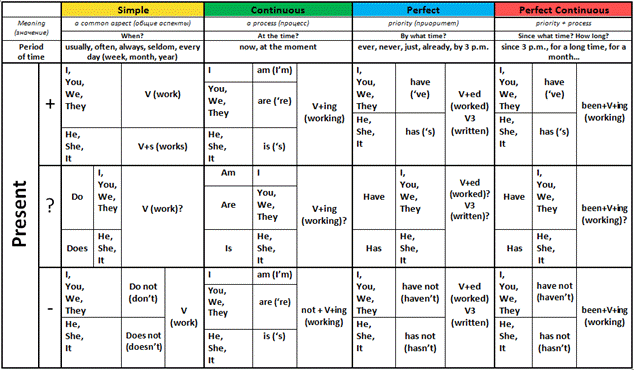

ПРИТЯЖАТЕЛЬНЫЙ ПАДЕЖ СУЩЕСТВИТЕЛЬНЫХ


ИМЯ ПРИЛАГАТЕЛЬНОЕ

СТЕПЕНИ СТРАВНЕНИЯ ПРИЛАГАТЕЛЬНЫХ

ПРАВИЛА НАПИСАНИЯ ОКОНЧАНИЙ ПРИЛАГАТЕЛЬНЫХ

НАРЕЧИЯ

СТЕПЕНИ СРАВНЕНИЯ НАРЕЧИЙ


4. ОБОРОТ THERE + TO BE


ГЛАГОЛ
ГЛАГОЛ “TO BE”

ГЛАГОЛ “TO HAVE”

ПАССИВНЫЙ ЗАЛОГ


5.4. ВРЕМЕНА ГРУППЫ SIMPLE

ВРЕМЕНА ГРУППЫ CONTINUOUS

ВРЕМЕНА ГРУППЫ PERFECT

СВОДНАЯ ТАБЛИЦА АНГЛИЙСКИХ ВРЕМЕН

КОСВЕННАЯ РЕЧЬ

НЕЛИЧНЫЕ ФОМЫ ГЛАГОЛА
ГЕРУНДИЙ ( GERUND )

ИНФИНИТИВ (INFINITIVE)
Образование основных форм инфинитива
Active Voice
to do, to look, to tell, to know, to ask
to be doing, to be watching, to be saying, to be writing
to have done, to have asked, to have seen, to have worked
to have been doing, to have been watching, to have been painting, to have been laughing
Употребление основных форм инфинитива
Active Voice
· I like to photograph my children.
·
· He seems to be looking for something.
· They should have finished this project by now.
· They turned out to have been preparing for the exam.
·
Употребление инфинитива без частицы to
1. После модальных глаголов
Could you help me?
You must do it.
You should have called her.
She may join us later.
2. После конструкций would rather, had better
I'd rather check the weather forecast now. You'd better get off the bus here.
3. После глагола do, используемого для усиления действия
· I do know what you mean.
· I did try!
4. После глаголов чувственного восприятия (to see, to hear, to feel, to watch, etc.), а также глаголов to let и to make
*Запомните! При употреблении этих глаголов в пассивном залоге перед инфинитивом ставится частица to .
· I heard somebody knock on the door.
· Let me buy you a cup of coffee.
· I will make him change his mind.
· She was seen to leave the house.
· He was made to clean all the.
5. После why и why not в вопросительных предложениях
Why not do it straight away?
Why hurry up? We will be there soon.
6. После союзов and, or, except, but, then, as и like
· I would like to sit on the sofa and read some book.
· I was ready for everything but hear this kind of news.
7. Иногда после глаголов to dare и to help
· How dare you not listen to your parents?
· Help me do this task, please!
Дата: 2019-02-25, просмотров: 592.